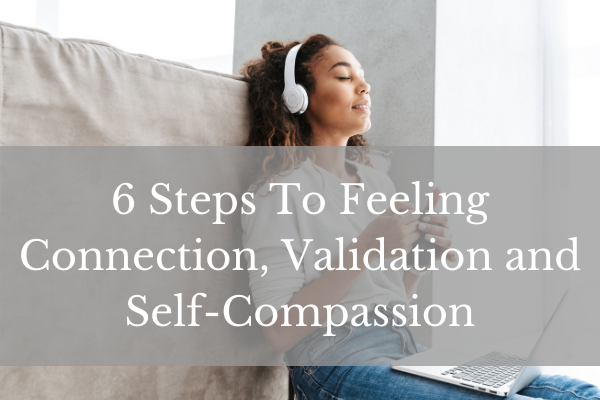The Felt Sense Podcast
Ep 3: Making Friendly Space
Hey there! MacPherson here, from It Begins To Move. This is the 3rd in a series of 4 episodes on Befriending Yourself. Today I’ll continue talking about friendliness, and the very important role it serves in healing, feeling calm and regulated. In the first episode on friendly regard, I discussed how the word friend is in part, based on the word regard, which means “to take notice of.” So, a true friend actively takes notice of your needs, wants and preferences, to learn about the unique things that make you, you, because…you’re probably different than they are in some way. And in the previous episode, I discussed how important it is for people with different needs and perspectives to make enough space for each other’s differing needs, with curiosity, respect and engagement, and without dominating or acquiescing. To be able to do that is an enormous feat, because our culture - most of western culture in particular - does not operate that way. Holding your own, AND someone else’s, differing needs at the same time, without abandoning your own needs and without making the other person abandon theirs, is like an impossibility! In our culture, doing that is like making gold from straw - like a myth that you hope can be true, but know that it’s actually impossible. Behaving and treating other people this way is not modeled by many others around us, and it’s not widely written about or displayed in mainstream media. How can we learn to treat other people with this kind of affirming respect, or know that we CAN actually expect it from others, if this isn’t demonstrated? How do you know that you could order an item at a restaurant, that’s not on the menu, unless someone directly taught you that you can break the social rules of being limited by the items only listed on the menu, and showed you how to order “off menu?” We behave the way we’re taught to behave, until we’re taught another way. So if lots of other people were unfriendly towards you, you likely learned to be unfriendly towards yourself. If your perspectives, opinions, needs and preferences were denied, shamed, ignored or put down, then you likely learned to do the same to others who had opinions or needs that competed with yours, likely learned how to talk to yourself and your own emotions in that same way, and you probably learned to expect AND accept when other people did the same to you….But here’s the thing: Pain needs to be seen. It needs to be affirmed. It needs to be befriended. It has been demonstrated that an empathic listener, an empathic receiver of your experience of pain, can make something that’s unbearable, a little less unbearable. Pain needs both to be seen, and it needs enough space to exist. When you’re struggling, or experiencing emotional pain, the most helpful thing is a true friend: someone who can notice and witness your experience, and also make space for all your feelings. Even if your feelings or your perspective is different from theirs. A friend doesn’t need to believe the same things you believe, to provide an affirmative, respectful, curious and empathic space in which to hold your tender experience. Because exerting a friendly regard is about another person’s perspective. Interestingly, this is one of the 4 parts of empathy, according to Brene Brown: 1) taking another person’s perspective (or in some of the language I’ve been using of the past few episodes: taking notice of someone else’s experience), 2) staying out of judgement (or in some of the language that I’ve been using: creating space for someone else’s feelings, perspectives, needs and wants, or not dominating someone else by insisting that your way of seeing things is the only way ), 3) recognizing the emotion and checking to see if you’ve ever experienced that emotion yourself and know what it’s like, and 4) communicating that you know what that emotion is like, that you can see and notice why they’d be feeling that way, and then giving them a friendly space in which to feel their tough and complex feelings. Pain needs empathy. Pain is vulnerable. As a person with a history in language and linguistics, the definitions and roots of words are so interesting to me. According to etymologyonline.com “vulnerable” comes from root “wele” which means “strike or wound.” So vulnerable means strikeable, woundable or able to be wounded or hurt, not protected. When you are vulnerable, you are hurt, hurting, exposed, tender, not protected. And this is the exact moment that you are also open to being hurt again. “Empathy” comes from the roots “en” and “pathos” meaning “in feeling.” That hurt needs empathic friendliness. It needs to be seen, held and understood. You need someone to be there WITH YOU, accompanying you while you’re in that state of vulnerable feeling. In the feeling. Being invalidated, denied, shamed, ignored or put down is the absolute worst, worst, most harmful thing for vulnerable pain. And just like in the previous episode on Making Friendly Space, if it feels ok to, you might imagine what it would be like to offer your own tender and sweet heart, friendly empathy when you’re feeling a big uncomfortable feeling? Imagine what it would be like for the parts of you that are actually experiencing hurt, anger, sadness, disappointment, or fear, to not be pushed down or shunned? What would it be like for those parts of yourself, the actual emotions you were experiencing, to be noticed, given space, acknowledged and validated? What would the experience of that be like? In the next episode, I’ll talk more about what modern neuroscience has demonstrated happens in your brain and body, when emotionally painful experiences are given exactly that. Take care, kind soul!

